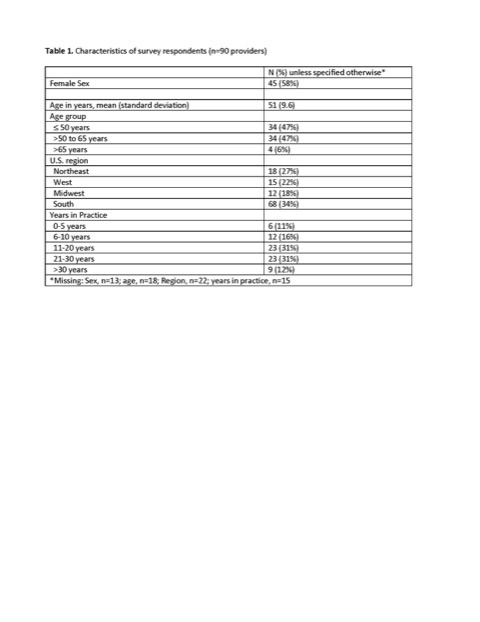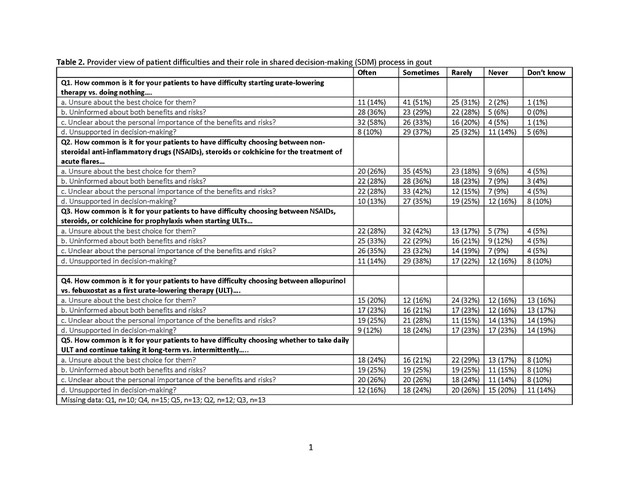Session Information
Date: Saturday, November 7, 2020
Title: Epidemiology & Public Health Poster II: OA, Osteoporosis, & Other Rheumatic Disease
Session Type: Poster Session B
Session Time: 9:00AM-11:00AM
Background/Purpose: To assess rheumatologists’ views and practices related to shared decision making (SDM) in gout treatment.
Methods: We performed a cross-sectional electronic survey of rheumatologists at U.S. Veterans Affairs (VA) medical centers, assessing views and practices related to SDM in gout.
Results: Of the 154 VA rheumatology providers eligible, 90 responded (response rate, 58%). Fifty-eight percent were female, the mean age was 51 years (standard deviation, 9.6), 42% had >20 years of experience in medical practice (Table 1).
Rheumatologists reported routinely offering a choice to their patients for: (1) starting urate-lowering therapy (ULT) for gout vs. doing nothing (70%); (2) choosing NSAIDs, corticosteroids, or colchicine for the treatment of acute flares (67%); and (3) choosing NSAIDs, corticosteroids, or colchicine for anti-inflammatory prophylaxis when starting ULT (51%; Appendix 1). Very few rheumatologists offered choice regarding: (4) choosing allopurinol vs. febuxostat as the first ULT (16%); and (5) taking daily ULT long-term vs. intermittently (15%).
Rheumatologists perceived that large proportion of patient were often or sometimes unsure of the best choice for these five decisions, respective proportions were 34%, 76%, 76%, 52%, and 54%. Similar proportions were often or sometimes uninformed about both medication benefits and risks, unclear about the personal importance of the benefits and risks, and unsupported in decision-making (Table 2). The rheumatologists reported that 44-64% of the patients were uninformed about both benefits and risks, 52-73% were unclear about the personal importance of the benefits and risks, and 36-52% were unsupported in decision-making (Table 2).
Conclusion: The majority of VA rheumatologists incorporated SDM in several gout treatment decisions. Rheumatologists also recognized that patients need better support to participate in SDM in gout.
 Table 1. Characteristics of survey respondents (n=90 providers)
Table 1. Characteristics of survey respondents (n=90 providers)
 Appendix 1. Provider practices for choice for the patient regarding gout treatment decisions
Appendix 1. Provider practices for choice for the patient regarding gout treatment decisions
 Table 2. Provider view of patient difficulties and their role in shared decision-making (SDM) process in gout
Table 2. Provider view of patient difficulties and their role in shared decision-making (SDM) process in gout
To cite this abstract in AMA style:
Singh J, Richards J, Chang E, Toupin-April T, Barton J. Provider Opinion and Support for Shared Decision-making in Gout Treatment: A Quality Improvement National Survey of Veterans Affairs Rheumatologists [abstract]. Arthritis Rheumatol. 2020; 72 (suppl 10). https://acrabstracts.org/abstract/provider-opinion-and-support-for-shared-decision-making-in-gout-treatment-a-quality-improvement-national-survey-of-veterans-affairs-rheumatologists/. Accessed .« Back to ACR Convergence 2020
ACR Meeting Abstracts - https://acrabstracts.org/abstract/provider-opinion-and-support-for-shared-decision-making-in-gout-treatment-a-quality-improvement-national-survey-of-veterans-affairs-rheumatologists/
